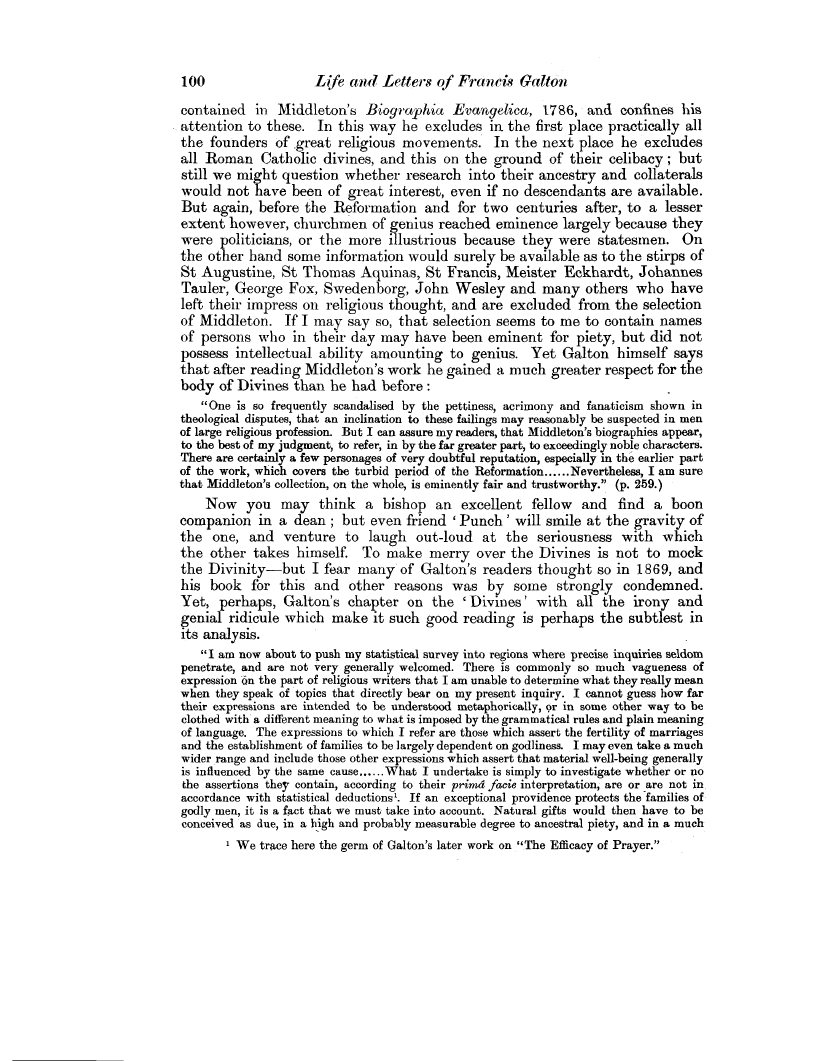100 Life and Letters of Francis Galton
contained in Middleton's Biographia Evangelica, 1786, and confines his attention to these. In this way he excludes in the first place practically all the founders of _great religious movements. In the next place he excludes all Roman Catholic divines, and this on the ground of their celibacy ; but still we might question whether research into their ancestry and collaterals would not have been of great interest, even if no descendants are available. But again, before the Reformation and for two centuries after, to a lesser extent however, churchmen of genius reached eminence largely because they were politicians, or the more illustrious because they were statesmen. On the other hand some information would surely be available as to the stirps of St Augustine, St Thomas Aquinas, St Francis, Meister Eckhardt, Johannes Tauler, George Fox, Swedenborg, John Wesley and many others who have left their impress on religious thought, and are excluded from the selection of Middleton. If I may say so, that selection seems to me to contain names of persons who in their day may have been eminent for piety, but did not possess intellectual ability amounting to genius. Yet Galton himself says that after reading Middleton's work he gained a much greater respect for the body of Divines than he had before
"One is so frequently scandalised by the pettiness, acrimony and fanaticism shown in theological disputes, that an inclination to these failings may reasonably be suspected in men of large religious profession. But I can assure my readers, that Middleton's biographies appear, to the best of my judgment, to refer, in by the far greater part, to exceedingly noble characters. There are certainly a few personages of very doubtful reputation, especially in the earlier part of the work, which covers the turbid period of the Reformation Nevertheless, I am sure
that Middleton's collection, on the whole, is eminently fair and trustworthy." (p. 259.)
Now you may think a bishop an excellent fellow and find a boon companion in a dean ; but even friend `Punch' will smile at the gravity of the one, and venture to laugh out-loud at the seriousness with which the other takes himself. To make merry over the Divines is not to mock the Divinity-but I fear many of Galton's readers thought so in 1869, and his book for this and other reasons was by some strongly condemned. Yet, perhaps, Galton's chapter on the `Divines' with all the irony and genial ridicule which make it such good reading is perhaps the subtlest in its analysis.
"I am now about to push my statistical survey into regions where precise inquiries seldom penetrate, and are not very generally welcomed. There is commonly so much vagueness of expression on the part of religious writers that I am unable to determine what they really mean when they speak of topics that directly bear on my present inquiry. I cannot guess how far their expressions are intended to be understood metaphorically, or in some other way to be clothed with a different meaning to what is imposed by the grammatical rules and plain meaning of language. The expressions to which I refer are those which assert the fertility of marriages and the establishment of families to be largely dependent on godliness. I may even take & much wider range and include those other expressions which assert that material well-being generally is influenced by the same cause What I undertake is simply to investigate whether or no the assertions they contain, according to their primd facie interpretation, are or _are not in accordance with statistical deductions'. If an exceptional providence protects the families of godly men, it is a fact that we must take into account. Natural gifts would then have to be conceived as due, in a high and probably measurable degree to ancestral piety, and in a much
1 We trace here the germ of Galton's later work on "The Efficacy of Prayer."

